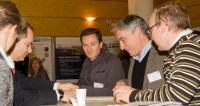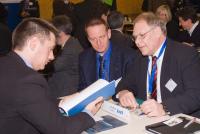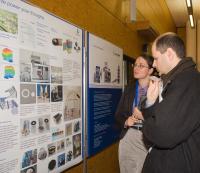- Home
- News
- General News
- Germany meets Grenoble
Germany meets Grenoble
29-01-2010
On 27 and 28 January 2010, the European research institutes in Grenoble ESRF, ILL and EMBL hosted the 1st Innovation Forum Germany @ Grenoble, organised on behalf of Germany’s Research Ministry, BMBF. Nearly 40 managers of German SMEs, technology transfer companies and research centres gathered for two days of presentations, visits and exchange with experts from eight institutes located in Grenoble.
Share
The aim of the Forum was to create opportunities for the participants from Germany to meet possible clients and cooperation partners from Grenoble. In addition to the ESRF, ILL and EMBL, also CEA (Leti and Liten), CNRS (Institut Néel and LPSC) and IRAM participated in the event.
The German government was represented by Andreas Drechsler, Head of the Department for European research centres in the Ministry of research, and Klaus Matthes, science counselor at the German embassy in Paris.
Following a series of presentations by the eight institutes from Grenoble, face-to-face cooperation talks between experts from Grenoble and visitors from Germany took place throughout the first day. The following morning provided opportunities for targeted visits to the institutes and further discussions.
 |
 |
 |
|
Three moments of the Forum. |
Valuable inspiration for Grenoble were provided by Klaus Thiessen, professor at Technology Park Berlin-Adlershof, which hosts 20.000 researchers and students from six university institutes, eleven national research centres and 400 companies. One of the fields of excellence at Adlershof is solar energy, with an annual industrial turnover of more than 1 billion Euros. Grenoble is not only sunnier than Berlin but also has big plans for deploying solar energy generators, so the experience from Berlin turned out to be possibly of big interest.
According to a quick opinion poll, both sides were extremely satisfied with the outcome. New potential procurement sources were identified by all institutes from Grenoble, and many contacts were made for licensing new technologies to industry.
Top image: One of the sessions of the Innovation Forum Germany.



